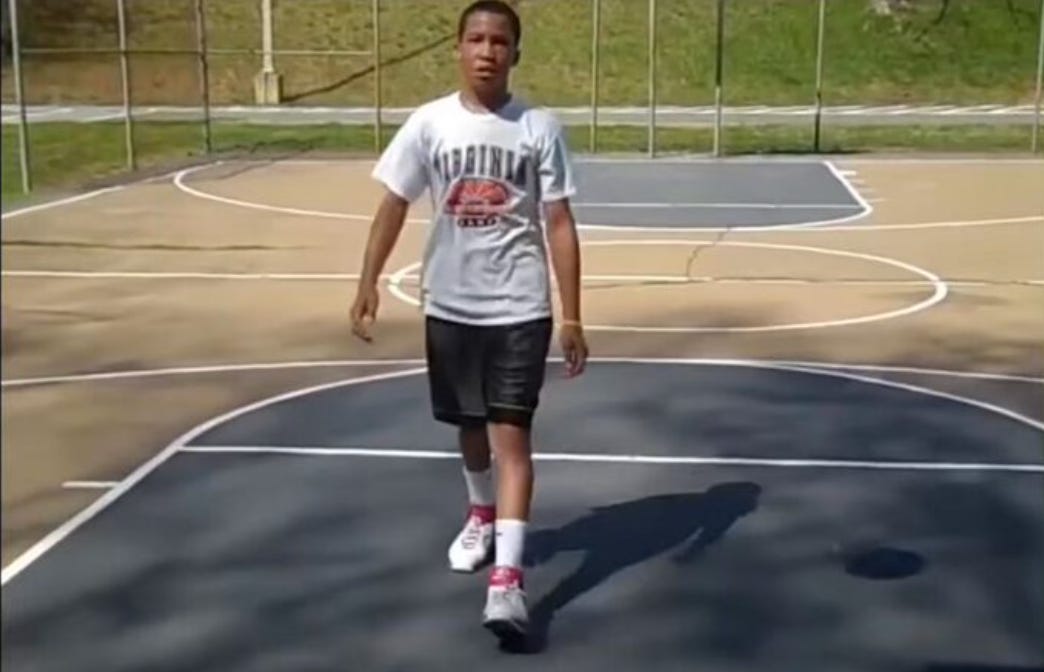Born to Play Basketball
In the midst of their longest winning streak in eleven seasons, the Knicks were being tested by a young, spry Pacers team trying to prove that they were a contender. New York was fatigued and was missing their second and third best players in Julius Randle and OG Anunoby. Next on their schedule was a massive primetime clash with the Lakers which meant the Knicks might look to conserve their energy against Indiana. Any other Knicks team in the last 50 years would have let this game slip away and their unfathomable two-and-a-half week run would have come to a disappointing end. But these are not your average Knicks and their number one option, Jalen Brunson, is not your average star.
Down three, Josh Hart spun and kicked the ball to Brunson who drilled a game-tying three amidst a classic “Bang!” call from Mike Breen. On the very next possession, Brunson chiseled his way past Buddy Hield and help from Aaron Nesmith for the go-ahead push-shot to give New York a 93-91 lead. He wasn’t done. On the very next possession, Brunson crossed over and drove left as articulated by Breen, pulled up for an elbow jumper, and sunk it with ease as he seems to always do, prompting what has become a legendary call from the G.O.A.T. of basketball broadcasting.
“Brunson drives, pulls up, jump shot, got it! Jalen Brunson: born to play basketball!” —Mike Breen
Brunson was born in August of 1996 in New Brunswick, New Jersey, and was in fact born into a basketball family. His father Rick played in the NBA for nine years. Rick was a journeyman—he only averaged 3.2 points for his career—but what he lacked in talent, he picked up in grit and determination.
From the meager age of two, when Rick was entering his first year with the Knicks, Jalen was convinced that he wanted to become a professional basketball player. When given the opportunity to surround himself with basketball, Brunson always partook. He sat in a stroller courtside while his dad practiced. When Rick would run track workouts, Jalen would join him while cruising around on his bike. He cut the sleeves off of his shirts to emulate the jerseys that his dad wore, pretended he was shooting in Madison Square Garden when he played on the mini-hoop in his kitchen, and even wore a suit before he played his mini-hoop games like the pros did.
Brunson would frequently sport his Latrell Sprewell Knicks jersey, wear orange and blue everywhere, and became a regular at dad’s games. Jalen was introduced to the bright lights of Madison Square Garden, known as the world’s most famous arena, from a very young age.
Unfortunately, Jalen would learn another lesson about the NBA as a child and it was moving from city to city. In his nine seasons, Rick played for Portland twice, New York, Boston, Chicago, Toronto, Los Angeles, Seattle, and Houston. Despite growing farther and farther away from the mecca of basketball in New York that Jalen had fallen in love with as a toddler, he never lost his love for the game. He continued to attend his father’s games, and became the type of locker room celebrity that Deuce Tatum is today for the Celtics. He even met Michael Jordan when his dad played with the Bulls, but declined for Jordan to sign his jersey, saying, “No. You’ll mess it up.”
Additionally, Jalen learned what hard work looked like. Watching his dad get passed around from team to team on non-guaranteed contracts was difficult for him but it showed him the commitment and work-ethic that playing in the NBA would require especially for someone of his small stature.
Eventually, the strains of NBA life would become too much for Rick Brunson. He was cut by Philadelphia prior to the 2006-2007 season which was a major blow for a man who had worked hard all summer to earn a roster spot. Jalen, after seeing his dad jump from team to team nearly ten different times, automatically assumed that he would end up somewhere else. Rick had to stop Jalen and tell him, “No, this is it. I’m done.”
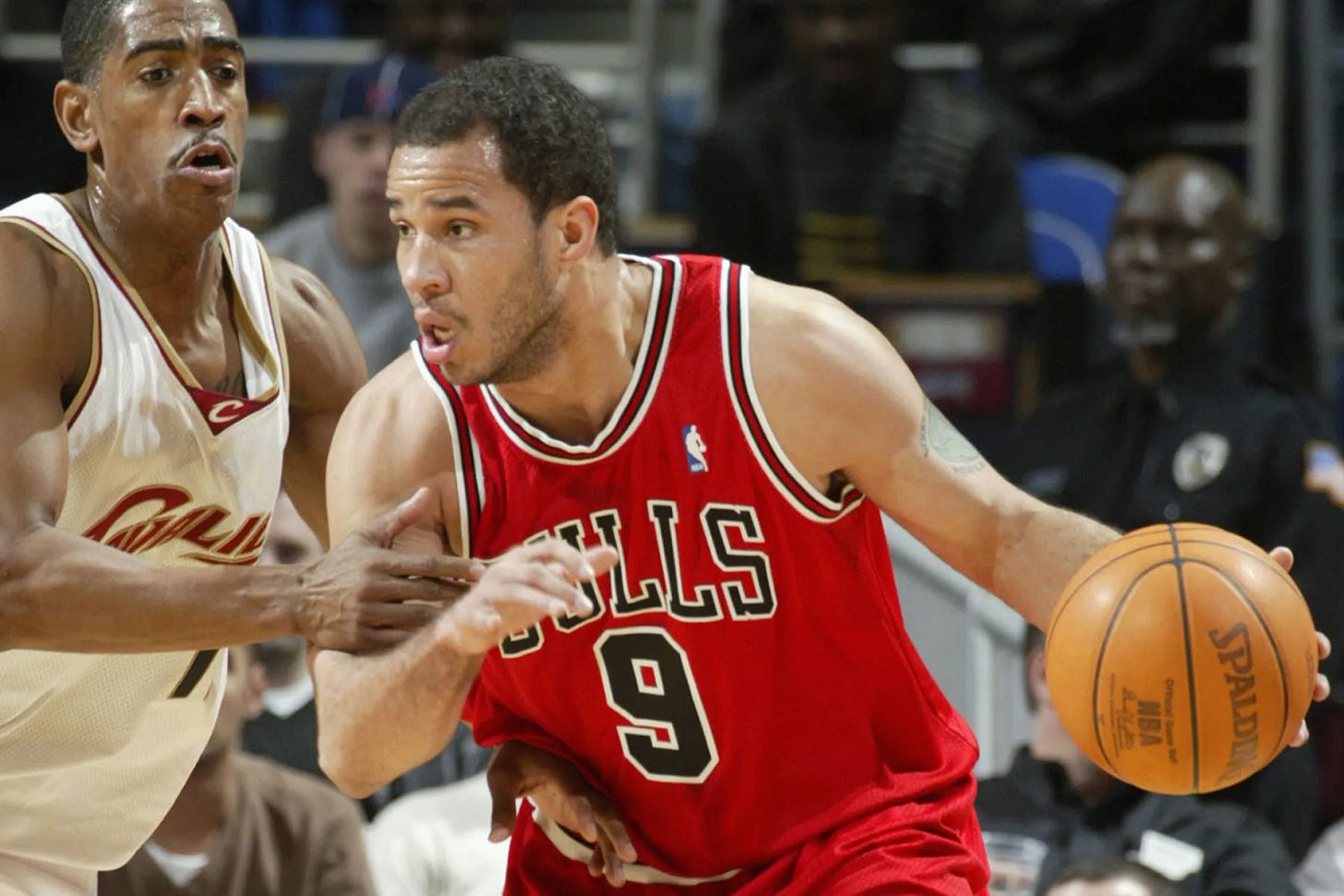
Jalen was crestfallen about the idea of not going to his dad’s workouts or games, not have a team to root on, and everything else that came with having a father in the league. But there was no time to fret. Jalen understood that while his father’s retirement marked the end of an era, it was the start of a new one.
Rick was on the same page. It was no secret to him that Jalen had developed a love for basketball from an unusually young age, and that it was his time to carry on the family name. Rick told Jalen “I don’t want you to live how I lived.” He had enjoyed the luxury of a long NBA career but was never able to call a city home and rarely got playing time. “If you really want to be a ballplayer, listen to what I tell you, and you will take a different route.”
The two got straight to work. For hours every day, Rick would put Jalen through strenuous training. At the bare minimum each day, Jalen would have to make 100 layups with his left hand, 100 with his right hand, dribble two balls around the block twice, and do 30 minutes of box jumps. According an article by Sports Illustrated, “Rick lowered the rim on the backyard basket to eight feet and banned Jalen from attempting three-pointers, for fear he’d develop poor mechanics.” —Sports Illustrated.
Rick’s workouts weren’t meant to build the flashiest AAU hooper that would get signed by Overtime Elite and have millions of social media followers. He was trying to turn Jalen into the most detail-oriented, mentally durable basketball player who would always be one step ahead of his opponents. He even taught Jalen to play with his left hand because left handed players are tougher to guard since they’re more unorthodox. To do so, he taped Jalen’s right thumb to his palm as to not interfere with his lefty jumper. Brunson is a natural righty but basketball was entirely different life for him. Whatever it is that he needed to do to gain an advantage over his peers, Jalen would do it.
This didn’t mean that Jalen was always willing to go the extra mile in his dad’s workouts. He was still at an age where he thought basketball was a given and that shooting 1,000 threes per day would get you to the NBA. In fact, Jalen loathed his father. Rick would make him do hill sprints with weighted vests in extreme heat and would scream things like “You don’t want to be a basketball player!” or “You don’t understand what it takes!”
“I didn’t realize what he was doing. I hated him. I wouldn’t talk to him.” —Jalen Brunson
Rick Brunson might have been building his son up to be a great basketball player but there were times when his “tough love” style of fatherhood was too tough on young Jalen. Brunson would often sulk in his room after workouts leaving his mother as the mediator between the two since Jalen wanted no part of his father. Oftentimes, when Jalen wouldn’t pass the ball enough in his games, Rick would scream at his son to pass the ball forcing Jalen into tears.
“None of these people came here to watch you play by yourself! Pass the ball or get out of the gym!” —Rick Brunson
As time went on, Jalen began to embrace Rick’s coaching, and hit his stride. He started to motivate himself by writing his dreams and aspirations on his bedroom wall and reminding himself what it would take every day to be an NBA player. With his father in attendance, Jalen was finally making a point to pass to his teammates in attempt to build their confidence.
Starring for the Stevenson Patriots outside of Chicago, where the Brunson family relocated after Rick became an assistant coach of the Bulls, Jalen was named the Illinois Gatorade player of the year in his junior season, averaging 23.3 points per game including a 57-point performance that broke the Stevenson High School single-game scoring record. Later that year, it was time for Brunson to take the next step in his basketball career. He had a list of eight schools that he could commit to, but for Michigan State, UConn, Purdue, Illinois, Kansas, Michigan, and Temple (where his dad attended), it was going to be a quick “no.” Brunson was all in on Villanova—an esteemed program with a Hall-of-Fame head coach in Jay Wright.
In his senior season of high school, Brunson averaged 25.4 PPG and was named to both the McDonalds All-American team and Team USA for the Nike Hoop Summit. He won the Gatorade Player of the Year award for the second straight season, and was crowned Mr. Basketball of Illinois.
Brunson settled right in at Villanova, scoring 9.6 PPG in his freshman season, earning Big East All-Freshman honors. He was the starting point guard on the 2015-2016 championship team alongside current teammates Josh Hart and Donte DiVincenzo. With his dad coaching in Minnesota and less present at his games as a result, Brunson continued to come back to a mantra that his parents taught him
“The magic is in the work” —Sandra and Rick Brunson
This was a saying that Jalen’s parents had been preaching to him since he was a young player. Brunson recalled them taping pieces of paper with the saying printed on it on the refrigerator, the garage door, and the bathroom mirror. Sandra and Rick even went as far as to send him pictures of the message throughout the day.
With “The magic is in the work” engraved within his psyche, Brunson kept working to reach the pinnacle of college basketball. In his sophomore season, he increased his scoring, rebounds, and assists, and was selected to the First Team All-Big East along with his teammate Josh Hart.
As Jalen progressed as a college player, Rick kept this distance, wanting to allow Jalen to develop under Coach Wright. However, Rick occasionally made the 30-mile drive to Villanova to watch his son compete and occasionally ask if he wanted to work out after games.
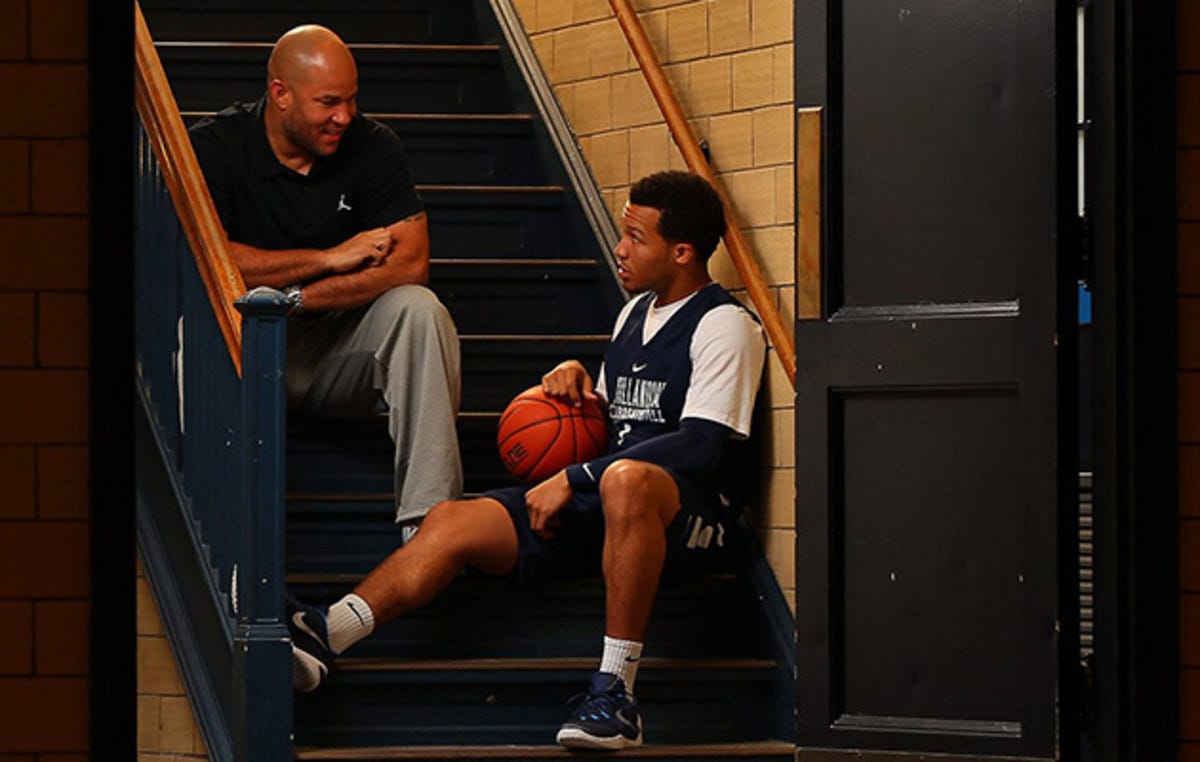
“Sometimes he asks me that on an off-day, and I’m like, O.K. There are times I feel like I need a new voice. But I always go back to that voice, because nobody cares as much as he cares. Nobody pushes me as much as he pushes. Even if it’s hard, I know it’s the best thing for me.” —Jalen Brunson
The following season, Brunson cemented his legacy into the college basketball history books, leading his team to their second National Championship in three years while averaging 18.9 points, 3.1 rebounds, and 4.6 assists. He won the Geasey, Cousy, and Olson awards, achieved second team All-Academic honors, won Big East Player of the Year, and above it all, was awarded the national college player of the year. In his postgame interview after Villanova’s championship victory, Brunson harped upon the importance of working as a team, being unselfish, and focusing on the little things—the exact values that his father emphasized when he was a kid.
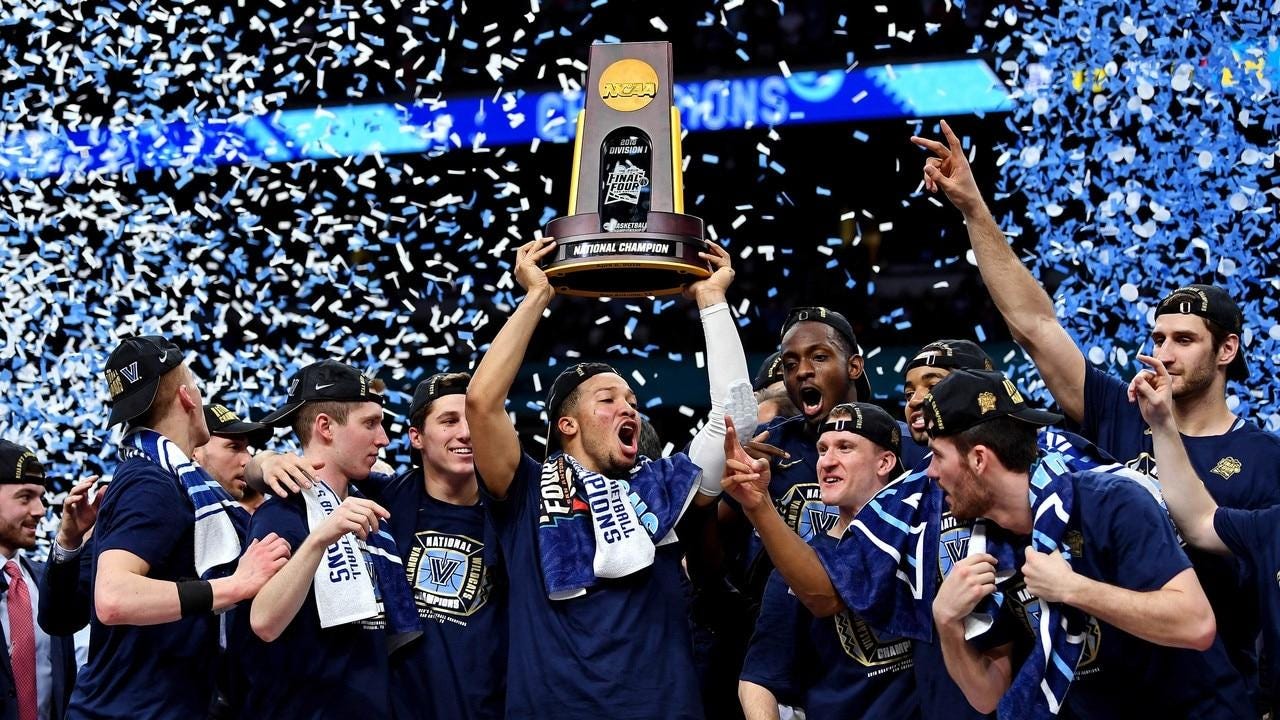
It was time for Brunson to take the next and final step towards his lifelong dream. Since the age of two, he had dreamed to play amongst the best players in the world and compete for an NBA title, and now, it was his time.
Unfortunately for Brunson, he would be passed up by 25 teams and watched 32 players get their name called before his including college teammates Mikal Bridges, Donte DiVincenzo, and Omari Spellman. With the 33rd pick in the draft, Brunson was selected by the Dallas Mavericks who had taken fellow guard and European phenom, Luka Doncic, with the third pick in the draft, meaning Brunson would have to scratch and claw for minutes in a clogged rotation.
Some players would shy away from fighting for their spot, but this was nothing new for the rookie. He had faced adversity throughout his entire basketball career, starting with the painstaking training that his father put him through. Brunson was ready for the moment.
Though his small size would appear to be a glaring weakness, one thing was for sure—Brunson played winning basketball. Right of the bat in Dallas, he averaged 9.3 points per game in his rookie season which was 11th most among rookies. His 3.2 assists were the fourth most. By his third season, he was a double digit scorer and a sixth man of the year candidate. By year four, he averaged 16.3 PPG, receiving votes for Most Improved Player.
Brunson had established himself as a quality starting shooting guard alongside Luka Doncic, but hadn’t had his signature moment yet. Cemented as a college star, Brunson hadn’t put the league on notice yet in the NBA like he dreamed he would as a kid. But he would get his chance in no time. In game 82 of the regular season, Doncic exited with a left calf strain, leaving a large void in the Mavericks backcourt with a playoff series against a talented Utah team right around the corner.
Brunson took initiative. He impressed in game 1 without the Slovenian superstar, dropping 24 points and five assists, but he wasn’t efficient enough in a six point loss to the Jazz. Knowing that the Mavs couldn’t afford to leave their home court in a 0-2 hole, Brunson had to dig deep—something he was used to. He scored a career-high 41 points in an epic 110-104 victory, shooting 15-25 from the field and 6-10 from three.
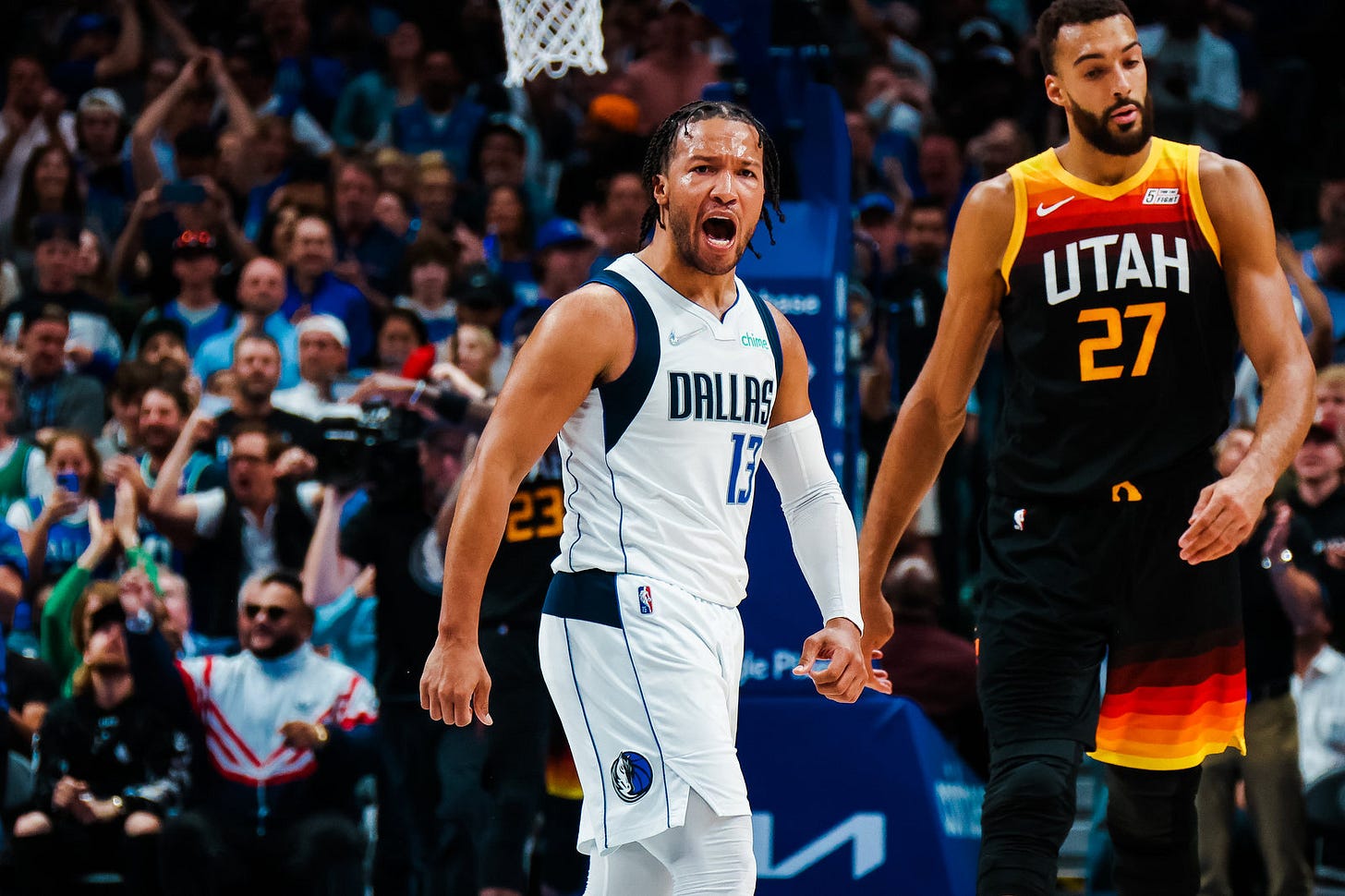
After that game, stardom became a reality for Brunson who, to this point, had been glazed over by the media with all the attention going towards Doncic. In the very next game, he scored 31 in a winning effort and even after Doncic’s return in game four, Brunson still averaged 23.7 PPG for the rest of the series. Throughout Dallas’ 18 playoff games, Brunson averaged 21.6 points which was more than players such as Kyrie Irving, Trae Young, and James Harden. To top it off, Brunson was the 7th leading total scorer in the entire playoffs.
Despite his playoff success, Brunson remained underrated. As he entered free agency, the Mavericks were unwilling to match other teams’ offers for him—a decision they’d soon regret. One team was craving a star that could handle the ball and run the offense at high level because they’d gone years without one. That team was the New York Knicks. They offered him a hefty 4 year / $100M deal to go back to Madison Square Garden—the place where it had all started for him. This was a difficult decision for Brunson who had grown quite comfortable in Dallas and was ascending towards being an All-Star. But New York had something that Dallas didn’t. Rick Brunson, the very man who had made Jalen’s dream possible was on Tom Thibodeau’s staff as an assistant coach and helped sway Jalen to the Big Apple. Without hesitation, Brunson signed.
Many thought the contract was too expensive for a player that had never averaged over 17 PPG in his career, but Brunson was ready to prove the doubters wrong. Through December, he scored 20 points per game and gave Knicks hope that he could be a star for them in the future, but the future came sooner than expected.
For the remainder of the 2022-2023 season, Brunson averaged a tick under 27 points, going for at least 34 points 11 different times. The once overlooked second-round pick all of a sudden looked like an All-NBA level player.
As the playoffs started to rumble, so did Brunson. He led his team in scoring with 24.0 PPG as the Knicks sunk the Cavs in a defensive-minded series. Against the Heat in round two, New York was playing without Julius Randle, but Brunson managed to put 31.0 PPG and 6.3 APG on 50% shooting despite the extra attention. In game six, he scored 41 points, but didn’t have enough gas in the tank to take out Miami who moved on to the conference finals with a 96-92 win. Fans could have looked at this season as a disappointment with the Knicks losing to an eight seed in the playoffs and knowing that the Eastern Conference playoff picture would be more formidable down the line, but no one saw it that way. The biggest, most critical sports city in America showered love upon their main man. Finally, Brunson was getting some respect. Finally, New York had a star.
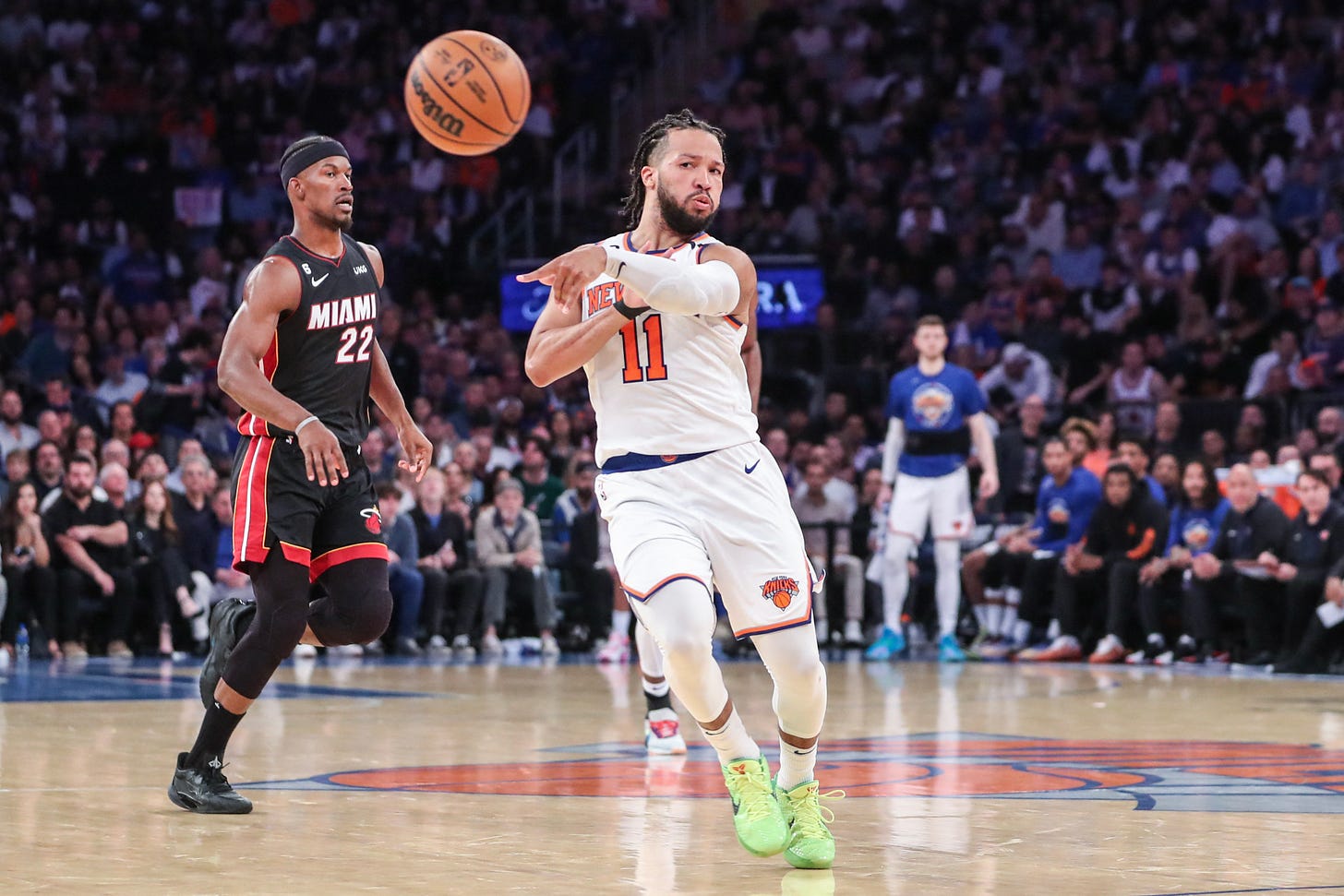
Coming into this season, expectations were high for Brunson and the Knicks. New York had true belief that President of Basketball Operations, Leon Rose, had assembled a team that would win with toughness and familiarity—they had signed Donte DiVincenzo in the offseason, re-aligning Brunson and Josh Hart with the third member of their Villanova championship trio. It was a fun story, but did the “Nova Knicks” have enough firepower to compete with the Celtics, Bucks, and 76ers in the East?
Early on, the skeptics appeared smart. The Knicks were just 17-15 at the end of 2023 coming off a three game slide and bad 140-126 loss to Indiana. They were falling short of expectations despite 26 PPG from Brunson and 24 from Julius Randle. However, the team rebounded by going 6-2 until January 17th when all the magic started. Powered by 32.0 points per game from Brunson, New York ripped off six wins in a row including a 38-point smashing of Denver. On January 27th, six games into the win streak, New York lost Randle and O.G. Anunoby to ill-timed injuries but Brunson just kept on answering the bell.
The Knicks crushed Charlotte and Utah on subsequent nights setting up an MSG clash with Indiana. Of course, you already know what happens after that. Brunson’s forty points pushed the Knicks to the finish line for their ninth win a row (their longest winning streak since 2013) to the ring of Mike Breen’s call—”Jalen Brunson! Born to play basketball!”
“The crowd is going bonkers because they just love this team, they love Brunson, they love what he stands for. They love that he was a second-round pick. Dallas decided we’re not going to pay him this much money, and he proves all the doubters wrong.” —Zach Lowe
Now, the Knicks are full speed ahead in the postseason taking on that very Indiana team and Brunson is putting up historic numbers. After a slow start vs Philadelphia, he rattled off four straight 40-point games a row becoming the first player to do so in the playoffs since Michael Jordan. He dropped 47 on the road in game 4 and heard MVP chants at Wells Fargo stadium—the very arena where his two Villanova banners were hung. After sinking the Pacers in game one with 43 points, Brunson injured his right wrist early in game two. He was clearly banged up coming out of the locker room in the second half, but managed to push the Knicks to the finish line, scoring 24 second-half points with only his left hand while Rick Brunson—the very man who taught him to play with his left—watched proudly from the Knicks bench.

Analysts don’t trust the Knicks in this postseason. Many picked Philadelphia to win game six and ultimately the entire series. I’ve seen several predictions saying that the Pacers would win one of the first two games and despite being down 2-0, will still win the series.
I see it differently. Brunson embodies resiliency. By moving from city to city as a child, he had to assimilate to all of his new surroundings, knowing that he could be gone in half a year. Because he was able to endure his father’s extreme workouts, Brunson is able to grind his way through pain and pressure and show out for a full 48 minutes. Being a second-round pick was a setback, but Brunson didn’t let it get to him. He put his head down and worked to be the superstar he’d always dreamed he would be. Brunson is only 6’1 and 190 pounds with a subpar vertical, but he made use around his shortcomings and now has very few holes in his game. His resiliency has been and will continue to be enough to power New York through the playoffs no matter how undermanned they are or how skilled their opponents are.
As you watch Brunson dominate the court, you get the feeling that basketball is not a game to him; it is a lifestyle. The run, rinse, repeat style of play that Brunson operates with is a clear result of the endless reps that his father forced him through as a kid. His relentless attacks to the basket are the effect of his father screaming in his face, saying that he wouldn’t make it to the NBA. Brunson won’t take no for an answer. His problem solving and knowledge of every tiny detail are the outcome of watching basketball from courtside from the mere age of two. No matter how Brunson gets the job done, one thing is for sure. He was born to play basketball.





